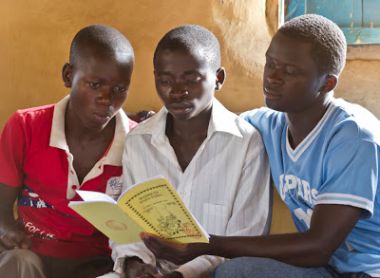Clean water: an unlikely obstacle to Bible translation

A new clean water system at the Bible translation centre in the Democratic Republic of Congo has given fresh life to its work.
Wycliffe Associates says that a lack of clean, running water has so far meant that their translators and other staff working in the city of Gemena have struggled to undertake their important work effectively.
There are many thousands of people in the DRC who do not yet have access to Scripture in their mother tongue, of which there are over 200 in the country, and translators are working to rectify the situation.
However, tired facilities and no running water are a thing of the past now that a new 150-foot well has been drilled at the centre and a 5,000 litre water tower erected. A distribution system carries water from the tank to the office building as well as outside of the centre for use in the community.
Wycliffe also hopes to begin renovation on a disused building to provide extra office space in the near future.
According to the charity, "Having clean water means that Bible translators and the people they serve can avoid disease and find ways for small communities to thrive."
It says a lack of clean water compounds problems brought on by political and religious persecution.
The DRC has struggled with political instability for years and has been ravaged by war and increasing violence. In addition to a history of civil war and unrest, the country also struggles with hunger and disease, and has high mortality rates as a result of an AIDS epidemic.
Wycliffe believes that providing the word of God in the nation's languages will bring hope and transformation to a desperate land.
"Quite frankly, it is one of the most challenging places for Bible Translation," says Bruce Smith, president and CEO of Wycliffe Associates.
"It is a place where many don't want to go or even talk about."
Wycliffe is also currently working in many other African nations, with four major projects taking place across the nation in the past twelve months. The most notable is perhaps in north-western Cameroon, where volunteer teams have taught locals to build their own home water filters, and now four micro businesses are functioning in the region to provide communities with clean water. Wycliffe's partner 'Water for Cameroon' has drilled or refurbished 32 water wells on the past five years.
Director Bart Maley says they are hoping technological developments will allow the number of people who have access to safe drinking water to increase.
"Two training teams have introduced a form of hand drilling that will hopefully be an appropriate technology that will allow Cameroonians to gain access to safe water," he says.
"We hope to be able to send more teams for this purpose in the future."
Wycliffe hopes to enhance Bible translation in all 10 languages of the Ndop Plain in northwest Cameroon, which is known as the 'Ndop cluster'. It is working to introduce safe drinking water for local communities and families.
"When our initial training teams travelled to Cameroon in 2008, one language within the cluster had the entire New Testament, and two had active translation programs," explains Maley.
"Translation activities were started in four of the remaining seven languages of the cluster in the Spring of 2013, and the last three languages are scheduled to begin translation in early 2014.
"Our goal for assisting the Ndop communities with access to clean water has always been driven by our desire to see Bible translation begin in the remaining languages of the cluster, so it is incredible to see that actually happening."











